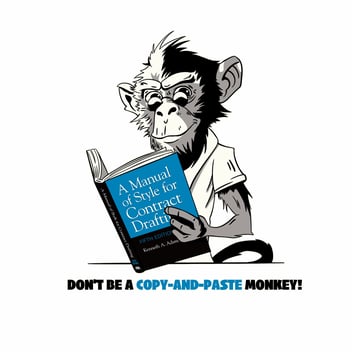 [Updated 3 December 2024: Today, for the first time, I wondered about services agreement versus service agreement, and I did this LinkedIn post about that. I've decided to go with service agreement, because it's simpler and because master service agreement seems more popular than master services agreement. But I haven't changed instances of services in this blog post to service.]
[Updated 3 December 2024: Today, for the first time, I wondered about services agreement versus service agreement, and I did this LinkedIn post about that. I've decided to go with service agreement, because it's simpler and because master service agreement seems more popular than master services agreement. But I haven't changed instances of services in this blog post to service.]
We’ve started work on Adams Contracts’ next automated template. (More about that in due course.) This post is about what we should call one kind of contract this template will produce.
The template will let users create contracts for any kind of services, but we’re starting with the simplest part of the whole, namely contracts under which the provider does some combination of thinking, research, and writing. That contrasts with contracts under which the provider undertakes a broader range of activities on its own premises—for example, conducting lab tests. Or activities on the client’s premises or elsewhere in the outside world. Information-technology services. Janitorial services. Whatever.
So what do we call a thinking-research-and-writing kind of contract? Let’s consider the options.
How about, well, services agreement? That’s not ideal—it wouldn’t tell the reader anything about the services involved.
What about independent contractor agreement? That’s used for companies who hire an individual (a human, not an entity—see this blog post) to perform whatever kind of services it wants performed. That wouldn’t be suitable for thinking-research-and-writing services, as independent contractor agreement tells us nothing about the services involved. And thinking-research-and-writing services might be performed by an entity, not an individual. (You do find independent contractor agreement used for contracts between two entities. That’s not surprising, given overuse of the “acting as independent contractor” provision; see this 2021 blog post.)
Then there’s professional services agreement. That sounds … posh! Who wouldn’t want to use it! “Yeah, my services are professional!” The word professional was originally applied to those who work in fields that require certification—lawyers, doctors, engineers, accountants, and maybe others. That seems unhelpfully narrow. On the other hand, use of professional has now expanded so as to make it essentially meaningless; see this 2016 blog post about the term contracts professional. Either way, professional services agreement isn’t suitable.
That leave us with … consulting agreement. Consulting means “providing professional or expert advice.” I reckon that will do nicely.
Well, that’s the title settled! Now, all that’s left is preparing the text of the contract itself …


